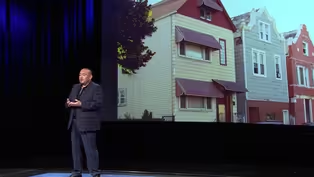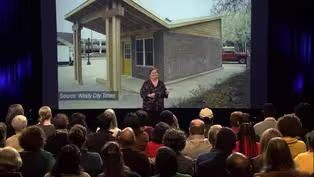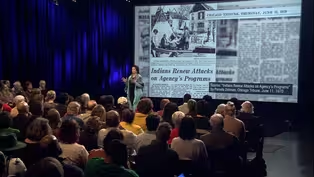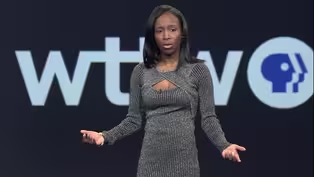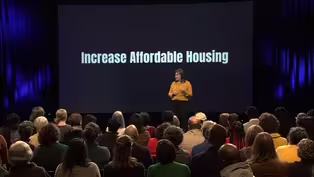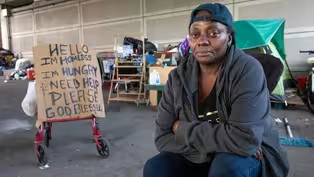FIRSTHAND
FIRSTHAND Talks: Building Our Way Out
Clip: Season 6 | 9m 20sVideo has Closed Captions
Nicole Bahena puts focus on using available funding to create affordable housing.
Nicole Bahena, Vice President at Community Partnerships, All Chicago asserts that homelessness is a housing problem that can be addressed with a new focus on using available funding to create affordable housing.
Problems playing video? | Closed Captioning Feedback
Problems playing video? | Closed Captioning Feedback
FIRSTHAND is a local public television program presented by WTTW
FIRSTHAND
FIRSTHAND Talks: Building Our Way Out
Clip: Season 6 | 9m 20sVideo has Closed Captions
Nicole Bahena, Vice President at Community Partnerships, All Chicago asserts that homelessness is a housing problem that can be addressed with a new focus on using available funding to create affordable housing.
Problems playing video? | Closed Captioning Feedback
How to Watch FIRSTHAND
FIRSTHAND is available to stream on pbs.org and the free PBS App, available on iPhone, Apple TV, Android TV, Android smartphones, Amazon Fire TV, Amazon Fire Tablet, Roku, Samsung Smart TV, and Vizio.
Providing Support for PBS.org
Learn Moreabout PBS online sponsorship(gentle serene music) (audience clapping) - "Why can't we just build them homes?"
That is a direct quote from my 7-year-old, Joey, after he and I had a lengthy conversation about the work that I do.
You see, according to Joey, I help people find homes, but I'm not a real estate agent.
I'm a social worker, and I have a passion for influencing policies and systems and practices that greatly impact people's lives.
And very early on in my career as a social worker, I realized that so many of the issues that people touch and that social workers work on are related to housing and whether someone has it or they don't.
And that makes sense because housing is the foundation for stability and security for all of us.
And without it, it's really difficult to do anything else like take care of yourself or your family or finding and keeping a job.
In fact, many countries have declared that housing is a human right.
And in 1949, the United Nations added adequate housing to the Universal Declaration of Human Rights, which the US signed onto.
I'll never forget the puzzled look on Joey's face when I told him that some people live on the streets because they don't have homes.
And that's when he came up with his solution, which is the right one, to just build them homes.
But what I didn't have the heart to tell him is that some people believe that people live on the streets because they choose to live that way, or people have made some bad choices in their life that must be rectified before they get access to housing.
On any given night in the United States, there are 650,000 people that experience homelessness.
And in Chicago, if you take the number of people who are living on the streets, living in emergency shelters, and those that are doubled up or couch surfing, meaning they're temporarily staying with friends or family because they have nowhere else to go.
Estimates put the number of Chicagoans experiencing homelessness over 68,000.
Even though the United States and Chicago has made some progress on reducing homelessness since 2007, in the last couple of years, we've started to see an uptick again.
And this is likely to continue, especially in Chicago with the influx of thousands of new migrants who also need a place to live, with the end of many COVID federal relief programs that really gave us what we needed for a very short period of time, but now has come to an end.
And also because Chicago, like every other city in the country, is experiencing an affordable housing crisis.
It might seem obvious, but homelessness is tied to the affordability of housing, which simply means that as housing prices increase, people have to spend a greater amount of their income on housing, which puts them more at risk of housing instability or homelessness.
40% of renters in the United States spend more than a third of their income on housing.
The cost of housing is rising faster in every single market in the country than wage growth is.
And there's nowhere in the country where if you're working a full-time job but at minimum wage, where you can afford a two-bedroom apartment.
And the local view in Chicago isn't much better.
Chicago ranks fifth of the 100 largest cities in the country for fastest rent increases.
For every 100 households that need affordable housing, only 28 can access it.
Housing affordability can happen in a few ways.
One is through having markets that produce naturally affordable housing for people with lower incomes.
And the other is through having government subsidy programs that make housing affordable for people with lower incomes.
Chicago and the United States have not been building enough housing to keep up with the demand, and this has been going on for a really long time.
In 1959, the US built a total of 18.5 million housing units in a single year.
And in 2022, that number was exactly the same, despite the fact that our population has increased by 63% during those two timeframes.
And based on the simple economic principle of supply and demand, we know that when there isn't enough housing to meet the demand, the cost for that housing increases.
So for example, when it's relatively affordable to buy a home, we see a lot of people leaving the rental market to purchase that home, which means there's a greater supply of units available in the market, which drives costs down.
But when home ownership becomes out of reach of many, then people stay in the rental market, which squeezes the entire rental market and really drives the costs of renting a unit up.
The second factor that impacts housing affordability is government subsidies.
And in the '50s, '60's and '70s, we saw the government invest heavily in creating a lot of new housing, a lot of new affordable housing, and providing subsidies for people so they could live in that housing.
But then in the '80s and '90s, we started to see developers who build housing sort of opt out of these programs.
And so now we're sort of faced with this affordable housing crisis.
And then came COVID-19 where we saw a whole new host of housing supply chain issues that slowed overall housing development, making it really hard to access construction supplies and increasing the cost of those supplies.
I believe, however, there is a silver lining as it relates to COVID-19, especially when it comes to housing and homelessness.
For the first time during COVID, leaders all across the country were face to face with the fact that many people could not practice safe social distancing in their own homes because they did not have a home.
Everybody was scrambling to find places that people experiencing homelessness could isolate or quarantine.
And just a few months into the pandemic, we also started to see people facing eviction.
So it highlighted just how precarious so many people's housing situations were.
In response to these issues, social workers and advocates and policy makers and leaders all over the country set forth to identify solutions to help people quickly gain access to their own homes and also to keep people in their homes.
First, we know we need to increase overall housing development, and efforts are currently underway to do just that.
The federal administration recently launched the Housing Supply Action Plan, which aims at closing the housing supply gap in five years.
And because of that, we're starting to see incentives for cities to remove or reduce restrictive zoning requirements that make it really difficult to build housing.
And there's also a significant investment of resources to help solve some of these supply chain issues, which should help drive the cost of rental housing down.
Second, we know we need to expand access to rental assistance, which is an important safety net for everybody in the country.
Rental assistance comes in a few forms.
It can be giving somebody a voucher so that they can cover some or all of their rent for an extended period of time, but it also can come in the form of an emergency request for rental assistance, because something might come up and somebody's not able to pay their rent for one or two months.
One of the other things that happened during COVID-19 was that there was a significant infusion in providing rental assistance because we had so many people who couldn't work who were at risk of being evicted.
And so we know that it works.
We have real hard data and evidence that shows that investment in rental assistance keeps people in their housing.
And last or third, we need to create more deeply affordable housing units.
So deeply affordable housing units are typically created when a developer pairs new or existing housing with subsidies either from the government or in some other fashion.
And those subsidies help make the housing affordable for people with very low income, such as somebody who's living on Social Security.
I feel more hopeful than I have been in the past because there's a very public recognition that the country is experiencing a housing crisis, and there's new political will and new financing and new solutions that COVID-19 showed for us.
And it's happening.
And I feel really good that I can tell my son Joey that his idea was the right one.
We should build people homes, and we are.
Thank you.
(audience clapping) (tones chiming)
FIRSTHAND Talks: The Power of Housing
Video has Closed Captions
Clip: S6 | 7m 39s | Jose Muñoz shares his childhood experience facing homelessness and food insecurity. (7m 39s)
FIRSTHAND: Homeless — The Migrant Experience Trailer
Preview: S6 | 29s | WTTW shares five migrant stories, revealing why they left home, their journeys, and their struggles. (29s)
FIRSTHAND Talks: Tiny Homes, Big Solutions
Video has Closed Captions
Clip: S6 | 9m 34s | Tracy Baim examines the use of tiny homes one possible solution to homelessness. (9m 34s)
FIRSTHAND Talks: Invisible No More
Video has Closed Captions
Clip: S6 | 8m 43s | Shelly Tucciarelli explores affordable housing development for Native Americans. (8m 43s)
FIRSTHAND Talks: Finding a Way Home
Video has Closed Captions
Clip: S6 | 5m 21s | Sharday Hamilton shares how public services failed her as a homeless teen mother. (5m 21s)
FIRSTHAND Talks: Building Our Way Out
Video has Closed Captions
Clip: S6 | 9m 20s | Nicole Bahena puts focus on using available funding to create affordable housing. (9m 20s)
Video has Closed Captions
Preview: S6 | 1m 19s | WTTW offers a look at the unique perspectives and challenging experiences of the unhoused. (1m 19s)
Providing Support for PBS.org
Learn Moreabout PBS online sponsorshipSupport for PBS provided by:
FIRSTHAND is a local public television program presented by WTTW
